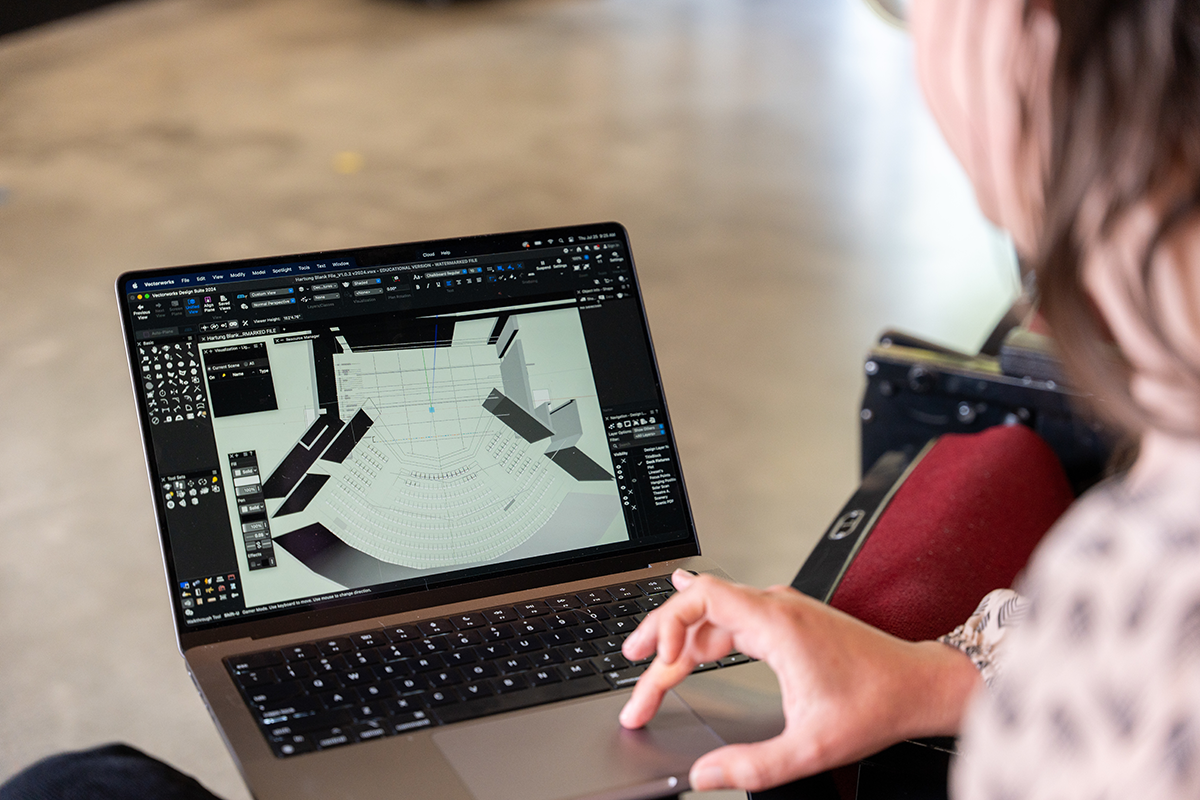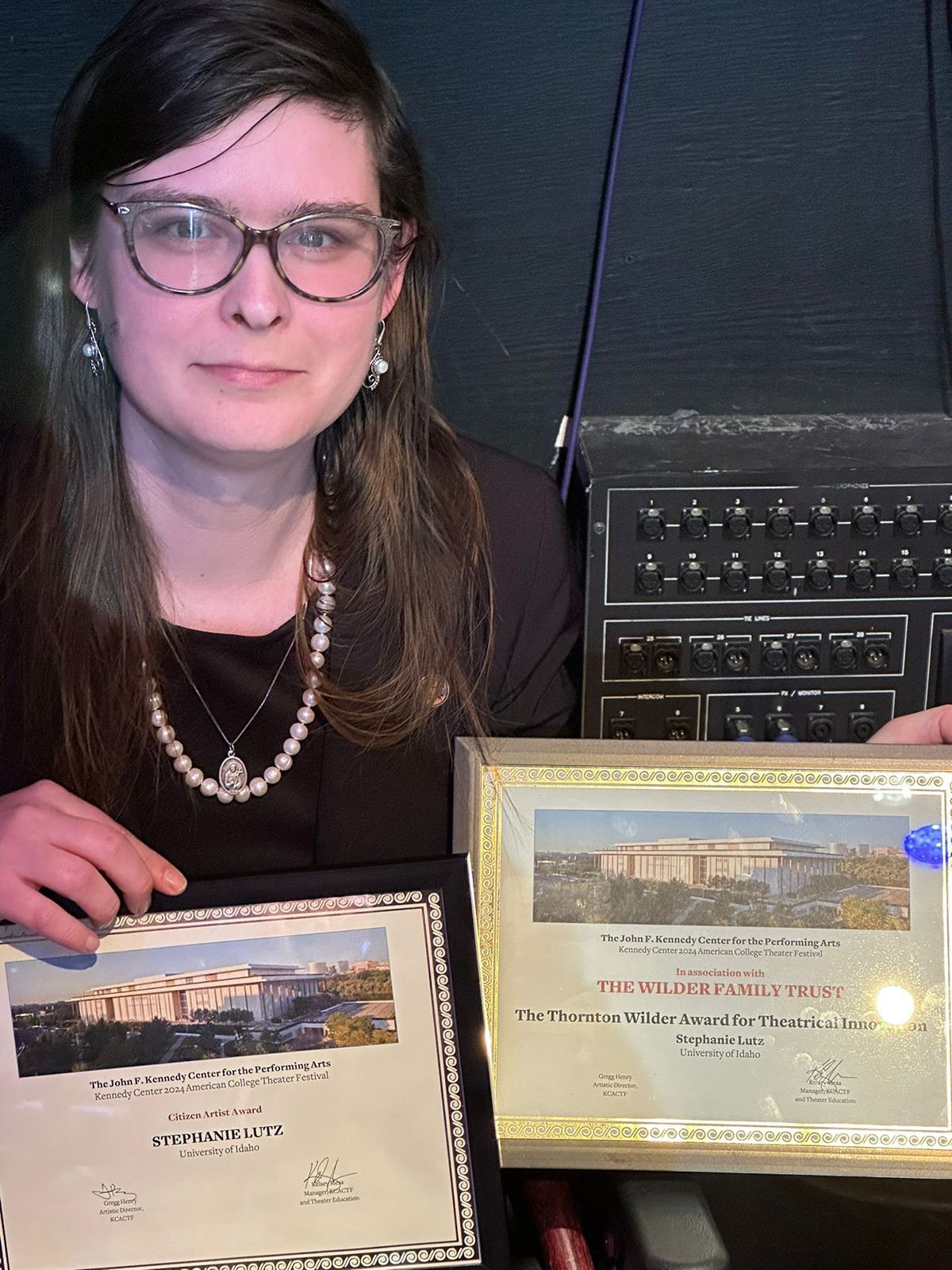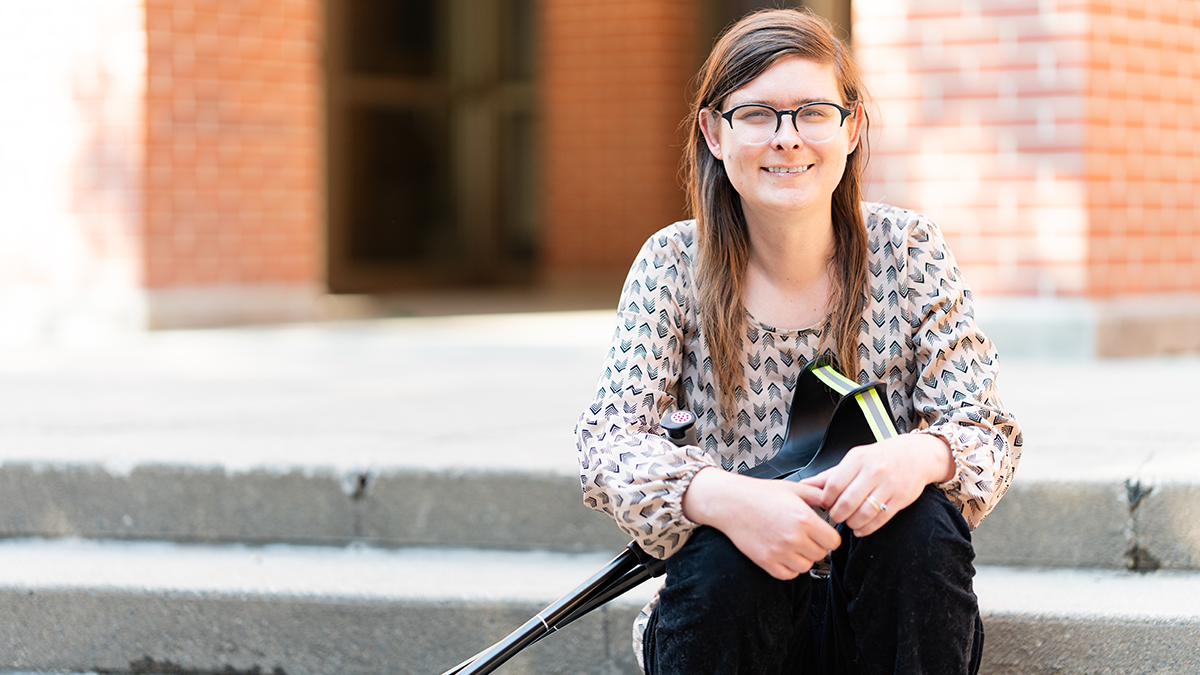MFA candidate creating AI-driven design software
CLASS grad student developing industry “game-changer”
After speaking with her doctor about her medical condition last year, Stephanie Lutz ’21 swiftly developed a plan of action. Her first stop was the library.
Lutz, who is working on her MFA in theatre, was diagnosed with early-onset Parkinson’s disease, which has caused diminished use of her extremities. To help herself — and others in her situation — she’s creating AI-assisted software to design theatre sets with voice commands to help her do what her hands no longer are consistently capable of doing.
Stephanie has sparked such an excitement in our space about this project. She’s won some awards and received recognition for this, but I’m not sure most people know how big this really is. This is a game-changer.Jesse Dreikosen, Theatre Arts Associate Chair
“I’ll tell the software how many lights to place in a specific spot, and they will be placed without me having to key anything in,” Lutz said. “I’ll ask it to put a desk designed in the 1800s in another spot, and it will give me photos to choose from.”
A talented artist who has been involved in lighting design, stage design, photography and many other facets of theater in 10 years of industry experience, Lutz is determined to improve not only her own situation, but also provide outlets for others who need help.
“Stephanie has sparked such an excitement in our space about this project,” said Jesse Dreikosen, associate chair of the theatre arts department. “She’s won some awards and received recognition for this, but I’m not sure most people know how big this really is. This is a game-changer.”
As part of her curriculum over the past year, Lutz has been dedicating her independent study classes toward developing and testing her software, which she hopes can also be used in architecture and other computer-aided drafting applications.

Jesse Dreikosen
Associate Chair, Department of Theatre Arts, Professor of Scene Design
Get with the program
Joel Atwood, Lutz’s husband and a software engineer at Schweitzer Engineering Laboratories in Pullman, Washington, remembered once that she checked out several books about the sun and studied every one of them thoroughly so she could put together a perfect model of it for one of her plays.
Turns out you can teach yourself to be a programmer with the same strategy.
“I didn’t even realize she was working on this until she asked me a coding question,” he said. “I didn’t know she knew anything about coding. I helped guide her to some resources about her question, but she basically taught herself two programming languages in a matter of months. She loves to read and learn and will probably be an expert on this by the time she’s done.”
Lutz’s vision is for her software to be a voice-activated, AI-driven tool where designers will be able to set up anything from lights to props to music through macros – computer instructions that stand for a sequence of operations.
“That’s the goal,” she said. “There is still a lot of work to be done and some of the technology I need to make this happen isn’t quite ready yet, but we’ve made a lot of progress.”
Her research is being encouraged by U of I. She’s used a lot of her independent study time developing opinion surveys and working on beta tests for the software, asking her classmates for suggestions and feedback along the way.
“As a department, we want to give our grad students space to choose their own path,” said Michael Brandt, associate clinical professor in theatre arts. “She’s not able to climb up ladders or go up catwalks right now, so this is a way for her to keep doing what she loves. And this can open up art and drafting to others who otherwise might not be able to be involved.”

Driven
Last February, Lutz received two honors for her software development ideas at the Region 7 Kennedy Center American College Theater Festival (KCACTF) in Spokane – the Advocacy and Innovation Award and the inaugural Thorton Wilder Award for Theatrical Innovation, the latter of which earned her and Atwood a trip to Washington, D.C., for the national KCACTF festival.
At first, shifting gears from lighting design to computer programming seems like an odd path for someone whose passion is theatre. But for Lutz, her drive has always been about solving a problem.
One of her favorite jobs at the Hartung Theatre is to program the lighting console. Instead of queuing up each individual spotlight during a performance, Lutz times out what lights need to be turned on at what time and in what place, then programs the information into the console. With one click, an entire performance worth of lighting work is set.
It is with that problem-solving mindset, as well as her penchant for reading and learning, that Lutz took on this current challenge.
“She pushes herself all the time,” Dreikosen said. “She’s incredibly self-motivated. She mentors undergraduate students, she’s into poetry and philosophy, she’s always looking for ways to learn. She asks herself hard questions and then is driven to find the answers.”
One of the hardest questions Lutz faces is about her condition. Admittedly frustrated because she never knows when the bad days are going to come – and bad days usually mean being in a wheelchair – she continues to research, continues learning and continues fighting for an answer that will help make a difference.
“It’s frustrating getting up every day thinking about this,” she said. “But even in a situation where I sometimes feel helpless, I want to help people. And this has the capacity to help people.”
Michael Brandt
Associate Clinical Professor of Theatre Arts in Technical Direction

Article by David Jackson, University Communications and Marketing
Photos by Garrett Britton, University of Idaho Visual Productions and courtesy of Stephanie Lutz
Published in August 2024











